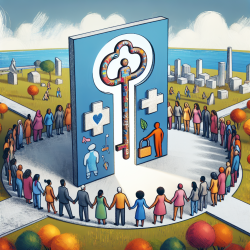The journey of immigrants is often fraught with challenges that extend beyond the physical act of moving from one country to another. It involves navigating complex social environments that significantly impact their health and well-being. Recent research titled Immigrant Perspectives of Social Connection in a Nontraditional Migration Area sheds light on the critical role social connections play in the lives of Latino immigrants in nontraditional migration areas.
The Importance of Social Connection
The study identifies seven domains of social connection that are particularly salient for immigrants: lens of the individual, immigrant experience, interpersonal support, community belonging, community capital, community navigation, and social acceptance. These domains highlight how social factors intersect to influence health outcomes among immigrant populations.
Lens of the Individual and Immigrant Experience
The individual lens and immigrant experience serve as filters through which immigrants perceive their social ecology. Personal attributes such as resilience and self-esteem are crucial in determining how immigrants engage with their communities. Understanding these personal dimensions can help practitioners tailor interventions that resonate with individual experiences.
Interpersonal Support and Community Belonging
Interpersonal relationships provide emotional support and contribute to an overall sense of community. The feeling of belonging within a community enhances mental health and well-being. Practitioners should encourage immigrants to foster both strong ties with family and friends and weak ties with acquaintances to improve their quality of life.
Community Capital and Navigation
Community capital refers to trusted resources within an immigrant's environment that offer support and connection. Effective community navigation is essential for accessing these resources. Practitioners can play a pivotal role by guiding immigrants in identifying and accessing community assets that enhance their well-being.
Social Acceptance
A sense of acceptance within both the Latino community and the broader society is vital for positive health outcomes. Practitioners should advocate for policies and infrastructure that promote inclusivity and reduce discrimination, thereby fostering an environment where immigrants feel welcomed and valued.
The Practitioner’s Role in Enhancing Immigrant Health
The findings from this research provide a framework for practitioners to develop interventions that address the unique needs of immigrants in nontraditional migration areas. By focusing on enhancing social connections across ecological systems, practitioners can help mitigate health disparities faced by immigrant populations.
Encouraging Further Research
This study opens up new avenues for research into how specific aspects of social connection influence immigrant health. Practitioners are encouraged to engage in further research to develop comprehensive measures that assess social connectedness among diverse immigrant communities.










